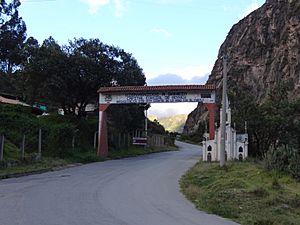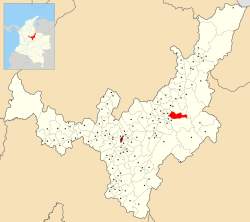Gámeza facts for kids
Quick facts for kids
Gámeza
|
||
|---|---|---|
|
Municipality and town
|
||

Town entrance
|
||
|
||

Location of the municipality and town of Gámeza in the Boyacá Department of Colombia
|
||
| Country | ||
| Department | Boyacá Department | |
| Province | Sugamuxi Province | |
| Founded | 4 November 1585 | |
| Area | ||
| • Municipality and town | 88 km2 (34 sq mi) | |
| • Urban | 70 km2 (30 sq mi) | |
| Elevation | 2,750 m (9,020 ft) | |
| Population
(2015)
|
||
| • Municipality and town | 4,856 | |
| • Density | 55.2/km2 (142.9/sq mi) | |
| • Urban | 1,566 | |
| Time zone | UTC-5 (Colombia Standard Time) | |
| Website | Official website: http://www.gameza-boyaca.gov.co/ | |
Gámeza (pronounced GAH-meh-sah) is a small town and a municipality in Colombia. It's located in the Boyacá Department, which is a part of the Sugamuxi Province. The town is about 18 kilometers (11 miles) from Sogamoso. Gámeza shares its borders with several other towns. To the north, it's next to Tasco and Corrales. To the south, you'll find Tópaga and Mongua. In the east, it borders Socotá, and to the west, it's again next to Corrales and Tópaga.
Contents
Gámeza's Ancient History
Before the Spanish arrived in the 1530s, Gámeza was home to native people. The first groups lived there during a time called the Herrera Period. Later, Gámeza became part of the Muisca Confederation. This was a large group of Muisca communities living in the central highlands of Colombia.
The Muisca Confederation
The Muisca Confederation was like a country ruled by different leaders. The main leaders were called zaques in Tunja and zipas in Bogotá. Other villages had their own leaders called caciques. Gámeza was part of the area ruled by the iraca of Sugamuxi.
When a new ruler was chosen for Sugamuxi, the cacique (leader) of Gámeza was always asked for their opinion. Other important leaders from nearby towns like Busbanzá, Toca, Boyacá, and Pesca were also consulted. If there was a disagreement, the ruler of Tundama would help settle it.
Arrival of the Spanish
The first Europeans to meet the Muisca people were soldiers led by conquistador Gonzalo Jiménez de Quesada. This happened in 1537. The last Muisca zaque (ruler) was named Aquiminzaque. His main wife was the daughter of the cacique of Gámeza.
After the Spanish took control, missionaries were sent to Gámeza. Their job was to teach the native people about catholicism. Gámeza was officially founded on November 4, 1585.
What Does Gámeza Mean?
The name Gámeza comes from "Gamza," which was the name of the village's cacique. In the Chibcha language of the Muisca people, "Gá" means "serf of the Sun." "Za" means "night."
Geography and Nature
Gámeza is located in the Eastern Ranges of the Andes mountains in Colombia. This area is known for its beautiful landscapes.
Natural Resources
There are gold deposits in the Gámeza area. This means that gold can be found underground. An important river, the Chicamocha River, actually starts its journey right here in Gámeza.
Economy and Work
The people of Gámeza mostly work in two main areas: farming and raising animals.
Farming and Dairy
Dairy farming is very important. This means people raise cows to produce milk and other dairy products. Farmers also grow many different crops. These include potatoes, peas, maize (corn), wheat, and barley.
Coal Mining
Another big part of the local economy is coal mining. This provides jobs and income for many people in the village.
Images for kids
See also
 In Spanish: Gámeza para niños
In Spanish: Gámeza para niños
 | Sharif Bey |
 | Hale Woodruff |
 | Richmond Barthé |
 | Purvis Young |





